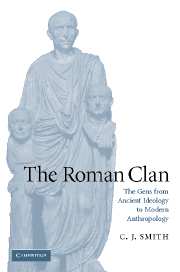Book contents
- Frontmatter
- Contents
- List of illustrations
- Preface
- List of abbreviations
- General introduction
- Part I THE EVIDENCE FOR THE GENS
- Part II TOWARDS AN INTERPRETATION OF THE GENS
- Appendix 1 Dionysius of Halicarnassus on the Roman curiae and religion
- Appendix 2 The missing curiae
- Select bibliography
- General index
- Index of ancient persons
- Index of passages discussed
General introduction
Published online by Cambridge University Press: 22 September 2009
- Frontmatter
- Contents
- List of illustrations
- Preface
- List of abbreviations
- General introduction
- Part I THE EVIDENCE FOR THE GENS
- Part II TOWARDS AN INTERPRETATION OF THE GENS
- Appendix 1 Dionysius of Halicarnassus on the Roman curiae and religion
- Appendix 2 The missing curiae
- Select bibliography
- General index
- Index of ancient persons
- Index of passages discussed
Summary
The gens, of all Roman institutions, is the one most alluded to and least explained. Only the absolute power of a father over his son has had such influence in subsequent philosophical and political thought. Historians have made the gens the key to Roman politics, archaeologists have sought the gens on the ground, and both have described as ‘gentilicial’ a huge array of activities and traces of social behaviour. Early modern thinkers found the justification for their definitions of contemporary nobility in the concept of gentilitas. Social anthropologists have used the gens as a model to help them understand societies as distant as Africa and native America. Engels developed Marx's belief that the Roman gens helped to explain the origin of private property. One of the most profound divisions in twentieth-century Italian jurisprudence has been between those who thought the gens (embodied by family) predated the state, and those who saw it as the product of the state. This debate is not only still ongoing, but also shadows a much wider, and much deeper, concern in modern thought about the nature of identity, as a real ethnic, biological fact, or a fictitious, political fig leaf concealing darker motives and deeper fears.
Yet there has been no substantial treatment of the gens in English for nearly a century, and none that I know of in any language which sets out to establish both the reality of the institution, and the myriad interpretations that have been laid upon it.
- Type
- Chapter
- Information
- The Roman ClanThe Gens from Ancient Ideology to Modern Anthropology, pp. 1 - 8Publisher: Cambridge University PressPrint publication year: 2006

